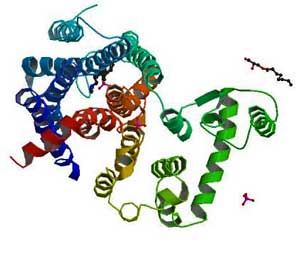

The cause of the severe fatigue found in diseases like chronic fatigue syndrome (ME/CFS), fibromyalgia (FM), and multiple sclerosis (MS) constitutes one of the great mysteries of medicine. For years fatigue was thought of as a minor symptom but researchers are beginning to recognize that severe fatigue is one of the most functionally debilitating symptoms that can occur.

A recent review paper examining the roots of severe fatigue in MS provided an opportunity to see how fatigue is being produced in it and whether fatigue might be produced in similar ways in ME/CFS and FM.
Fatigue
Multiple sclerosis and fatigue: A review on the contribution of inflammation and immune-mediated neurodegeneration. Robert Patejdl, Chris K. Penner b, Thomas K. Noacka, Uwe K. Zettl Autoimmunity Reviews xxx (2015) xxx–xxx
Fatigue in MS is often the first symptom to show up and is one of the most debilitating symptoms that many MS patients experience. The cause of the movement problems in MS is fairly clear but the cause of the fatigue in MS is something of a mystery.
The Central Nervous System – Multiple Sclerosis
The extent of the central nervous system lesions (nerve demyelination) found in MS tracks very well with the progression of the disease. Severe fatigue, however, can show up before the lesions are most prominent or before significant movement issues occur. This early occurrence of severe fatigue is probably why some people with ME/CFS and probably fibromyalgia are either misdiagnosed with MS or are given brain scans to determine if they have it.

Several hypotheses have been generated to explain why these lesions are causing fatigue
- Compensation – The loss of signal strength between cortical regions causes other parts of the brain to jump in to compensate. This use of extra brain matter is inefficient, and increases metabolic needs – and fatigue is a natural result.
- Brain stem damage in MS impairs the activation of the cerebral cortex which is connected to the thalamus and basal ganglia. The thalamus is the seat of alertness and the basal ganglia affects “reward” (which is tightly tied to fatigue), the autonomic nervous system and movement.
- Motor region – Lesions in the motor region are associated with quick fatigability in MS during physical exercises.
- HPA Axis – Lesions in the hypothalamus in MS patients affect circadian and endocrine factors. The disruption of the circadian rhythm can impact sleep – causing fatigue, and endocrine factors regulate metabolic and immune processes.
The authors suggested that each of these hypotheses are probably too limited in their scope. They proposed that the fatigue in MS probably results from a broad breakdown of a master subcortical network in the brain that governs alertness, energy production, etc. This suggests that different regions of the brain that keep us alert are simply not communicating well with each other.
This hypothesis suggests that the thalamus may play a key role as it controls the activation of the cerebral cortex. Both fatigue and thalamic atrophy occur early in MS.
The Central Nervous System – ME/CFS/FM
Patients with CFS activate more wider area of activated frontal regions…. in order to increase their poorer task performance with massive mental effort. This is likely to be less efficient and costly in terms of energy requirements. Mizuno et. Al. 2015
Lesions in different parts of the brain are associated with fatigue in MS. Those same lesions are not usually found in FM and ME/CFS. Some studies suggest, however, that the same areas of the brain may be impacted.
Compensatory, Less Efficient Brain Functioning Causes Fatigue – several studies suggest the mental fatigue found in ME/CFS may result from a similar compensatory response as seen in MS. In ME/CFS more brain regions than normal are required to complete a task. This is believed to result in less efficient brain activity, greater use of brain resources for simple tasks, and ultimately fatigue.
Brain Stem Damage – Barndem’s fascinating 2011 study suggested brainstem damage in ME/CFS was producing altered autonomic nervous system functioning. The greatest damage was found in the reticular activation system which activates the cerebral cortex via the thalamus. Similar to MS, Barnden’s findings suggested that reduced activation of the cerebral cortex and other upper brain regions was present.
The Zinn’s fascinating EEG studies highlighted in the Stanford Chronic Fatigue Syndrome Symposium suggested that reduced activation of the cortex was highly associated with fatigue in ME/CFS. They characterized ME/CFS as a “global expression of central nervous system hypoactivation”; i.e. it appeared that significant parts of ME/CFS patients’ brain were underactivated. Their results suggested that reduced “arousal” from the brainstem may be to blame. In the Stanford newsletter from early this year, Dr. Montoya stated that the paper was in publication. It has not been published yet.
Several studies have also found evidence of brainstem problems in FM.
Reduced Activation of the Motor Region – The ability of repetitive transcranial magnetic stimulation (rTMS) to increase motor cortex activation and significantly decrease the pain of FM patients suggests that motor cortex activation is reduced in FM as well. Reduced motor performance in ME/CFS patients suggests they have problems controlling voluntary muscle activities.
Neuroendocrine Changes – Several studies suggest that HPA axis changes contribute to the fatigue in MS but they do so in way opposite to ME/CFS. Reduced activation of the HPA axis contributes to the fatigue in ME/CFS and FM while increased activation does so in MS.
Thalamus – Several studies suggest problems with the thalamus exist in FM. Thalamus issues in FM have been associated with alpha-delta sleep problems, reduced pain inhibition and increased stress.
The Central Nervous System in ME/CFS/FM and MS – MS patients have lesions. ME/CFS and FM patients may have some lesions but not nearly to the extent as MS. Studies suggest, though, that similar parts of the brain that have been associated with increased fatigue are affected in both disorders.
Inflammation
Multiple Sclerosis
The fact that similar types of fatigue occur in MS, infections, systemic autoimmune diseases, and malignant tumors suggests that inflammation and cytokines probably contribute to the severe fatigue often seen in MS. Cytokines are important drivers of the flu-like symptoms (“sickness behavior”) produced during an infection – and associated with MS. Some of them can affect central nervous system functioning. It makes sense that they would play a role.
The existing data does not, however, suggest that inflammatory factors found in the blood contribute strongly to the fatigue found in MS. (The same is true, by the way, for rheumatoid arthritis – another inflammatory disease.)
That’s odd because markers of inflammation in the blood are associated with disease progression in MS. One study, though, found that the immune cells in fatigued MS patients were producing fewer cytokines than normal. Other studies have produced contradictory findings regarding cytokines and fatigue. Sometimes cytokines are increased and sometimes they are not.
The upshot is that while it’s clear that pro-inflammatory cytokines in the brain contribute strongly to MS the role that cytokines in the periphery or blood contribute is unclear.
Chronic Fatigue Syndrome (ME/CFS)
The cytokine situation in ME/CFS is, as always, complicated. A recent review found consistent evidence of one cytokine abnormality in ME/CFS (TGF-b). While natural killer cytotoxicity is consistently reduced in ME/CFS the cytokine results one might expect to result from that have not consistently shown up.
A recent study comparing healthy controls and moderately and severely ill ME/CFS patients demonstrates how complicated the cytokine issue is. Of the approximately 25 immune factors measured (IL-1ra, Il-1b, IL-2, IL-4, IL-5, IL-6, IL-6, IL-1, Il-8, IL-9, IL-10, IL-12p70, IL-13, IL-17, FGF, eotaxin, G-CSF, GM-CSF, IP-10, PDGF-BB, IFN-y, TNF-α and VEGF) only six were different between one or more of the groups
When they did differ they often didn’t differ in the direction one might have expected. One would expect that pro-inflammatory cytokines would be lowest in the healthy controls, higher in the moderate patients, and highest in the severely ill patients. That pattern, however, rarely occurred.
In fact, the most common pattern to emerge (4/6) in the few cytokines that were different, was that the severely ill patients looked more like the healthy controls than the moderately ill patients.
- A pro-inflammatory chemokine (RANTES) was significantly higher in the moderate ME/CFS patients than both the healthy controls and the severely ill patients.
- An important regulatory pro-inflammatory cytokine IL-1b is strongly associated with fatigue in RA patients. In fact, the authors of a recent animal study proposed that IL-1B is a required factor in immunologically produced fatigue in the brain. IL-1b, though, was not increased in the severely ill patients but was in the moderately ill patients. With regards to IL-1B, the severely ill ME/CFS patients looked more like the healthy controls than the moderate ill patients.
- Il-6 was decreased in the moderate patients relative to both the healthy controls and the severely ill patients. Again – the severely ill patients looked more like the healthy controls than the moderately ill patients.
- IFN-y was significantly increased in the severely ill patients relative to the moderately ill ME/CFS patient but again – not relative to the healthy controls (!).
- Only with IL-7 and 8 did the pattern expected show up; these cytokines were highest in the most severely ill.
Since duration of illness was not correlated with illness severity, the findings – immune upregulation in the moderately ill and immune downregulation in the severely ill – did not necessarily track with those from the CFI immune study.
It should be noted that similar difficulties with cytokine studies have shown up in MS.
Conclusion – The immune system is complicated and capturing its effects in the blood has not been easy either in ME/CFS or MS.
Post-exertional Malaise
Fatigue and post-exertional malaise are different. Fatigue is not necessarily associated with exercise or activity while PEM, of course, strongly is.
Alan Light found markedly different symptom presentations and gene expression levels in ME/CFS vs MS patients after exercise. The MS patients entered the exercise feeling very fatigued, got worse after the exercise but then quickly rebounded with a day or two.
The ME/CFS patients entered the exercise study feeling less fatigued but crashed severely after the exercise and did not rebound quickly. Exercise also triggered few changes in gene expression in the MS patients (they were similar to controls) but dramatic changes in the ME/CFS patients.
Conclusion – Both diseases feature fatigue but the physiological responses to exercise appear to be very different in each. Light’s paper suggests that the PEM in ME/CFS may indeed be a very unusual occurrence.
Treatment
The FDA has approved no less that thirteen drugs to treat MS, at least one of which, Copaxone (glatiramer acetate) appears to be able to reliably reduce fatigue. (Health Rising will cover Copaxone more in a blog about a person with ME/CFS who was diagnosed with MS and whose fatigue diminished markedly while she was on Copaxone). The monoclonal antibody Natalizumab also appears to be able to decrease fatigue in some MS patients.
Fatigue is common in rheumatic disorders such as rheumatoid arthritis, Sjogren’s Syndrome and systemic lupus. Because the medications used in these disorders often focus in altering immune functioning they present possibilities for ME/CFS/FM patients.

Immune altering drugs have worked better in altering pain than fatigue in other diseases. Newer drugs may work better.
An overview of these immune altering drugs (methotrexate and leflunomide, biologics (infliximab, adalimumab, etanercept, golimumab and certolizumab), anti-IL-6 (tocilizumab), immunoglobulins (abatacept) and Rituximab) found that, at least in rheumatoid arthritis they may improve pain but generally have had small effects on fatigue.
The review concluded that “fatigue is a multi-factorial symptom related to pain, functioning and psychological factors, but does not seem to be related exclusively to inflammation, which is reflected by joint disease activity”
Note that Rituximab – currently under investigation in ME/CFS – is in this list. If Rituximab turns out to have large effects on fatigue in ME/CFS it will change how people understand Rituximab and how it works.
Some new biologic drugs appear to be more effective in fighting fatigue. The first IL-17 antibody – Secukinumab and tofacitinib, an oral Janus kinase inhibitor both improved fatigue significantly. Secukinumab improved physical functioning in patients with psoriatic arthritis. The success of Secukinumab is intriguing given the interest in IL-17 in ME/CFS.
Conclusion – in general immune targeted drugs do not appear to be particularly effective at reducing fatigue in other diseases. We know that Ampligen and Rituximab can be very effective in reducing fatigue in some ME/CFS patients. Further studies are needed to know how many and which ones.
Conclusions
Central nervous system problems appear to track best with fatigue production in ME/CFS, FM and MS at this point. Brainstem and the midbrain issues which interfere with activation of the cerebral cortex and other parts of the brain, in particular, appear to be present in both ME/CFS and MS. The thalamus and basal ganglia may feature prominently in fatigue production in these diseases.
People with ME/CFS or MS also appear to use more brain regions than normal to accomplish tasks – an inherently fatiguing process. Since the demyelinating lesions found in MS do not occur in ME/CFS/FM, other issues (low grade inflammation?) are probably affecting brain regions in these diseases.
Evidence that inflammation in the periphery (the body as opposed to the brain) is contributing to the fatigue in MS, RA and ME/CFS is inconsistent. HPA axis problems, on the other hand, appear to contribute to fatigue in both ME/CFS and MS (albeit in different directions.)
Inflammation reducing drugs can effectively relieve pain in rheumatological diseases but have had only small effects on fatigue. Some newer immune modulating drugs appear to be more effective. The field of immune altering drugs is growing rapidly and we should expect more drugs to enter the market as time goes on.
Both ME/CFS and MS patients experience fatigue but people with multiple sclerosis do not experience the extent of post-exertional malaise present in ME/CFS.
Finally one ME/CFS patient’s successful experience with an MS drug suggests that the treatment options known to reduce fatigue in MS might be able to reduce fatigue in ME/CFS.
Health Rising’s Painless Recurring Donation Drive Continues
We are so close; we’re about 15 $5 recurring donors away from meeting our goal. Join the crowd and contribute just $5 a month. It won’t hurt your bottom line (you won’t even notice it) but it will sure help ours. Find out more here.



 Health Rising’s Quickie Summer Donation Drive is On!
Health Rising’s Quickie Summer Donation Drive is On!




It’s about time they started seriously researching the connection between ME/CFS and MS. I have ME/CFS and fibromyalgia and I have (had, one has predeceased me) two sisters with MS. Many of our symptoms are similar and I’ve known for almost 30 years that the diseases are related. I’ve written letters, talked to doctors, drained my brain and energy trying to get anyone to listen to me. Also, there is obviously a genetic link, which needs to be explored. Let’s get a handle on these illnesses so some actual progress can be made. Thanks for listening.
Two sisters with MS and you have ME/CFS; maybe similar immune weaknesses just showed up a bit differently.
Another ME/CFS-MS connection: people with infectious mononucleosis/glandular fever (serious EBV infection) have an increased risk of getting either…..
Yes, I was first diagnosed with EBV in 1959, and became very ill with chronic EBV in 1987. I soon learned I had what was called CFIDS and at the same time, FM. That was just about the time of the Incline Village epidemic, and I had a chance to listen to Dr. Peterson in about 1989. I have had chronic recurring CMV, HHV6 and other viruses for 28 1/2 years. I’m quite sure my deceased younger sister had a recurring herpes virus since childhood. We obviously have a genetic predisposition to these illnesses in our family, just manifesting differently. I fear I may have passed them along to my 3 children, now 55, 54 & 50 yrs. old, but so far they seem OK. It’s a horrible inheritance,so I hope they are safe. But it’s in the genes. BTW, my husband also has ME/CFS and FM, and I’m quite sure he caught the ME/CFS from me when I was very sick about 1987/1988. I believe he already had symptoms of FM, but I think I’m responsible for his ME/CFS. I can speculate that it all began for me when I was about 15 and had multiple mercury amalgam fillings done to my teeth. That was when I started losing my memory and stopped getting straight A’s in high school. It has been down hill since then – for about 60 years. I’m a survivor. I have had to do my own medical research and teach my doctors about the illnesses along the way. I’m truly worn out at this time, as age takes its toll as well. Hoping that an effective treatment comes along soon for all the younger people. It will be too late for me.
A long time for you! Hopefully if your kids made it this far they will be OK.
It would be useful to also look at MCS which is often characterized by fatigue after exposure to chemicals the individual has been sensitized to.
Absolutely, I have had MCS for 20yrs. It developed after moving to a new town and the first symptom was, extreme tiredness.
Like I have stated many times before when I came to be sicker than I ever had been in my life, in the fall of 91 after Cervical Cancer 1/91 and Parvovirus B19 Spring 1990, the doctors were just certain it was MS. But after 2 years of extensive testing, and only finding inflammation of unknown origin in my body, they called Fibromyalgia and told me it would not be progressive. Liars.
I was only sick twice before in my life before this, and after have gotten progressively worse with symptoms that mimics Fibromyalgia, MS, ME and Lupus. But test negative for those, again inflammation of unknown origin. Cancer of Uterus, kidney failure, nodules destroyed thyroid, inflammation of unknown origin. Unknown reason for kidney disease and thyroid.
Thanks to all the good information I have gathered here though, my smart Doctors want to have me tested for low blood volume to see if that could be the root to my episodes of low BP with seizure like activity, kidney disease because kidneys may not be getting proper blood supply and POTS. Also they want to look into inflammation of my ganglia, as possible unknown origin and Human parvovirus B19 as the root causation.
Don’t know if it will solve anything, but it might be nice to know what started this journey.
I know I got sicker and sicker after each mercury dental removal and too long a disbelieve from doctors. I had epstein barr virus,have severe adrenal insufficiency now, ME, hashimoto.My days are filled with trying to go outside, failing, trying to stay awake, dragging myself on the stairs, having constant heart palpitations and a body that refuses to get better despite all my spending of my savings.I will loose my job soon for good.it’s is a living nightmare! I think that all these above mentioned diseases are an opening into looking differently at medical care & also another better functioning world.
Thanks, Cort, for continuously keeping us up to date on the latest research.
It’s so frustrating that so many diseases have clear biomarkers but ME / CFS / FM do not.
I didn’t realize that PEM was uncommom with ME / CFS or FM. It has always been the case with me. I had a sudden onset of FM / CFS one morning in 1993 and of course have been sick ever since. I wouldn’t even call it post exertional malaise. I would call it post exertional debilitation. I downsized my life last year and that involved a short distance move and October 2014. I still haven’t recovered from that move. so I don’t know if my FM / me / CFS has just finally deteriorated after all those years of thinking that exercise was good for me or if the move was just so strenuous physically and emotionally that I may someday gain a little bit more strength in a little less pain. but life does not stop and I can’t just sleep as much as I want every day. I still have a home that I can barely take care of, some pets, daughter at college and another daughter who lives 750 miles away that I see two or three times a year. as usual, once I get to a location to visit family, I spend most of my time in bed and then when I get home I’m in bed again for most of each day for several weeks.
when the pain gets really bad I have found that two extra strength ibuprofen diminish the pain about 80%. When the ibuprofen where is off, the pain returns. when I do have the opportunity to rest a lot, my strength returns very gradually at incremental amounts and the pain does decrease. I keep track of everything on a number system everyday so I see a direct correlation between rest and slight improvement but I’m still so far from normal that I have little hope of ever being a very active person again. at this point I’d be very glad to be able to walk 4 or 5 times around the house.
Julie G, not sure why you think that the article said “PEM was uncommom with ME / CFS or FM”. I didn’t pick that up. If it says that, it’s incorrect.
I’ve become interested in Natalizumab during my search for new hypotheses (one suggests integrin involvement), hence I found it interesting that an integrin antagonist improved fatigue in some patients.
I’d like to hear from anyone who has taken Natalizumab, for MS or otherwise to discuss the effects on physical fatigue and brain fog.